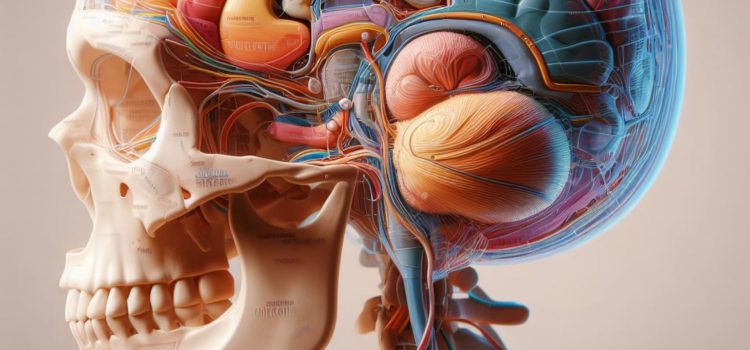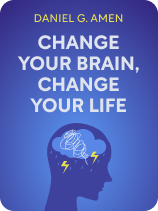

This article is an excerpt from the Shortform book guide to "Change Your Brain, Change Your Life" by Daniel G. Amen. Shortform has the world's best summaries and analyses of books you should be reading.
Like this article? Sign up for a free trial here.
What are the regions of the brain and their functions? How do your mind and body depend on your brain?
The brain has five main regions, each playing a unique role: the limbic system, the basal ganglia, the prefrontal cortex, the anterior cingulate gyrus (ACG), and the temporal lobes. Dr. Daniel G. Amen discusses these five regions of the brain in his book Change Your Brain, Change Your Life.
Keep reading to learn about the areas of the brain and what they do.
The Regions of the Brain and Their Functions
What are the regions of the brain and their functions? According to Amen, it’s important to know because damage or dysfunction in any of these regions can lead to their own set of specific symptoms.
(Shortform note: According to one study, the idea that certain brain regions are linked to particular functions may be too rigid, since the entire cerebral cortex activates during most functions—not just the area associated with that function. This study also shows that brain activity isn’t localized but moves in waves throughout the entire brain. However, like Amen, many scientists argue that the brain is made up of largely independent parts, theorizing that, though the parts are connected by neural pathways, they operate with a certain degree of autonomy.)
Just as with improving overall well-being and brain health, overcoming these symptoms requires a holistic approach: Amen recommends a range of biological, psychological, social, and spiritual treatments to repair and optimize each brain region. We’ll explore the functions of each of these regions, potential symptoms resulting from dysfunction, and Amen’s targeted treatments and strategies for healing each region so that it can function at its best.
(Shortform note: Amen advocates getting vitamin prescriptions from his clinics based on your medical history and symptoms. However, since the prescriptions are individually tailored by medical professionals, we focus on the more general ways you can optimize your brain health.)
Brain Region #1: The Limbic System
According to Amen, the limbic system plays a pivotal role in forming and consolidating your emotional responses and memories—for example, recalling the warmth of a hug or feeling motivated by a rewarding task. Your limbic system does this by:
- Regulating emotions: It plays a pivotal role in how you experience and express emotions.
- Forming memories: It helps you form and consolidate long-term memories, influencing how you recall past events and experiences.
- Guiding behavior: It influences your responses to emotional stimuli, shaping how you react in different situations.
- Generating motivation: It moderates feelings of motivation, reward, and pleasure, impacting your behavior and decision-making.
- Fostering social bonds: It facilitates emotional connections with others.
- Modulating physiological functions: It regulates appetite, sleep cycles, and libido.
- Processing sensory information: It directly processes your sense of smell, contributing to your perception and response to scents in your environment.
Brain Region #2: The Basal Ganglia
According to Amen, your basal ganglia modulate your reactions and behaviors. For example, when you jump with excitement at good news, or your hands tremble in nervous anticipation, it’s your basal ganglia integrating your feelings and movements. Your basal ganglia achieve this by:
- Coordinating motor control and inhibiting unwanted behaviors: They oversee voluntary movements, integrate feelings, and suppress undesired actions.
- Enhancing cognition: They contribute to decision-making, planning, and problem-solving.
- Regulating emotions and anxiety levels: They aid in emotional processing and mood regulation while helping set appropriate anxiety levels.
- Influencing motivation and reward responses: They direct the brain’s reward system— amplifying motivation, pleasure, and the anticipation of rewards.
- Supporting habit development: They enable the efficient learning and repetition of specific behaviors.
Brain Region #3: The Prefrontal Cortex
According to Amen, the prefrontal cortex oversees your executive functions, enabling the modulation of your behaviors and emotions. Examples of this include when you meticulously plan your day, manage your time efficiently, or connect empathetically with a friend. Your prefrontal cortex enables you to behave this way by:
- Guiding executive functions, behavior, and attention: It directs cognitive processes, such as concentration, decision-making, self-control, coordination, adaptability, time management, critical thinking, communication, and goal-directed attention.
- Regulating emotions and fostering empathy: It enables you to effectively feel and express your emotions and develop empathic connections with others.
Brain Region #4: The Anterior Cingulate Gyrus
According to Amen, the anterior cingulate gyrus plays a crucial role in mental flexibility and decision-making. For example, it allows you to easily shift your attention from one task to another or adapt smoothly to a new idea. Your anterior cingulate gyrus accomplishes this by:
- Facilitating cognitive flexibility: It promotes the ability to effortlessly shift attention between various topics, ideas, and issues—fostering a versatile and fluid thought process.
- Enhancing error detection and conflict resolution: It serves as a cognitive center for detecting errors and resolving conflicts during decision-making, contributing to improved cognitive functioning.
Brain Region #5: The Temporal Lobes
According to Amen, the temporal lobes are integral to understanding language and recalling memories. For example, they help you interpret the tone of someone’s voice or recognize a familiar face. Your temporal lobes enable you to do this by:
- Processing auditory information: They allow you to hear and understand sounds in your environment.
- Language comprehension and production: They support spoken and written language, helping you communicate effectively.
- Visual perception and recognition: They allow you to see and identify objects, faces, and scenes.
- Memory formation and retrieval: They play a crucial role in forming and recalling long-term memories, affecting how you remember experiences and events.

———End of Preview———
Like what you just read? Read the rest of the world's best book summary and analysis of Daniel G. Amen's "Change Your Brain, Change Your Life" at Shortform.
Here's what you'll find in our full Change Your Brain, Change Your Life summary:
- A more effective approach to overcoming physical, mental, and cognitive issues
- The four factors to nurture to improve your brain health
- Why listening to Mozart can enhance your focus and mood control






